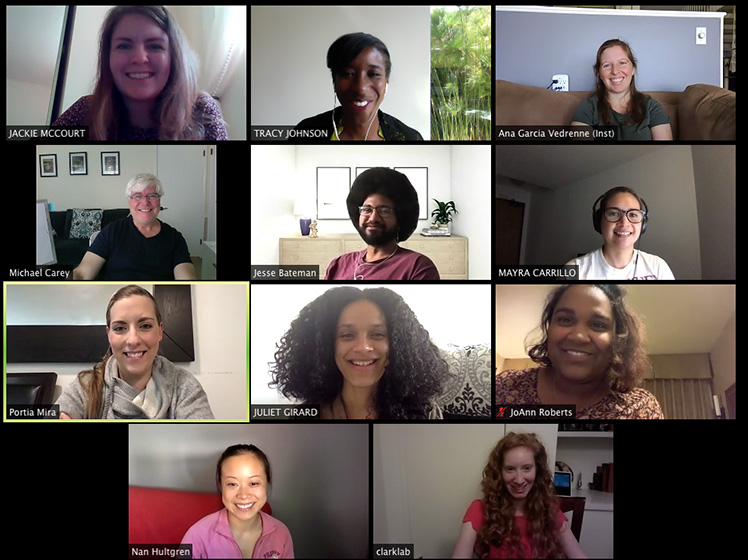PhD Trainees
Please review both the research lab updates and the educational area of the DGSOM website for information relevant to you.
- In accordance with new guidance from the UCLA Vice Chancellor for Research, research activities have been ramped down and in-lab activities are minimized, except for approved essential personnel and essential experiments.
- In context of this directive, the guiding principle of the following guidelines is to follow the public health imperatives needed to flatten the curve of the spread of COVID-19 while keeping trainees (graduate students and postdocs) actively engaged in the research process. Note that trainees (including graduate students and postdoctoral scholars) are not mandated to serve as essential personnel. The decision to report to campus lies with the trainee, not their research advisor.
- The Dean’s Office, joined by an infectious disease expert, hosted a virtual town hall for the research community on March 18. Watch the recorded session and Q&As.
- If you have specific concerns or questions related to your training situation or program requirements, please reach out to your PI. If your PI is unavailable or you need to escalate a concern higher, please contact Greg Payne or Lynn Talton.

Improving Computational Skills
The UCLA Institute for Quantitative and Computational Biosciences (QCB) has opened its registration portal for the second half of the Spring 2020 Quarter; all classes, which are streamed online, are now open for enrollment. QCB workshops are free for UCLA faculty, staff, affiliates, and students..
Guidelines for remote activities
- Both UC Path and Graduate Division are fully functional and processing payments as usual now and it is expected this will continue in the future.
- Undergraduate students should not be in the lab but should engage remotely.
- For graduate students and postdocs, productive remote activities could include fellowship/grant proposals, manuscript preparation, performing data analysis, catching up with the literature, writing a review article, preparing for thesis committee meetings and exams, learning programming or new computational methods (Collaboratory workshops).
- Lab meetings and journal clubs should be moved to a virtual format.
- For graduate student thesis committee meetings, the goal should be to maintain progress towards degree.
- Graduate Council has relaxed the policy for remote participation.
- Thesis Defense, Oral Qualifying Exam and annual committee meetings should be arranged as completely virtual meetings at the normal time rather than delaying until an in-person meeting is possible. Ramping down of research activities provides additional time to prepare for these meetings with the thesis committee.
- First year students doing rotations should engage with the lab they have selected for their 3rd rotation.
- Rotation students should not be involved in any in-lab activities but should contact their rotation adviser to develop a plan to work remotely.
- Specific activities for rotation students could include writing a research proposal based on research topics in the lab (F31 or NSF format), reporting on current literature relevant to lab research, writing a review article, analyzing data from lab, using preliminary data from the lab to prepare a report in the form of a manuscript.
- During the rotation, students should be in regular contact with the rotation adviser and if appropriate a direct supervisor.
- Rotation students should also participate remotely in lab meetings and journal clubs, and meet other lab members to learn about projects in the lab.
- Depending on the pandemic situation, if in-lab research becomes possible during the Spring quarter or in the summer, GPB will provide student funding to allow a rotation student to continue in the lab for a period to be determined, likely between 5 and 10 weeks.
- As we move forward, contact your program/home area director or Greg Payne if you have questions or issues.
General Updates from the School of Medicine
- We have implemented a provisional emergency telecommuting protocol. Students, trainees, staff and faculty have been directed to work/study remotely to the extent operationally feasible.
- Educational content is being delivered remotely.
- All nonessential university-related international and domestic travel is suspended for staff and faculty.
- All nonessential events of any size are suspended through the end of spring quarter.
- We are ramping down research activities that will not cause irreparable harm to the research project and minimizing in-lab activities.
- For clinical research, the policy on human research visits at UCLA campuses has been updated to limit/suspend in-person research visits (specifics online).
Access to DGSOM buildings
- Effective Wednesday, March 18: perimeter doors of DGSOM buildings – including Geffen Hall and the entire CHS complex, Reed, Gonda, MRL, NRB, BSRB/OHRC, Factor, and Ueberroth – will require badge entry until further notice.
- If you already have after-hours access, you will be able to enter the buildings using your BruinCard/UCLA Health ID badge. If you do not already have after-hours access and you will continue to require access to our buildings, please contact DGSOMBuildOps@mednet.ucla.edu.
- If you have any additional questions, please email Erin Quinn, Director, DGSOM Safety.
Other Links to Accurate and Current Information
Wellness
Your emotional health and well-being are of the utmost importance.
Click the button below for Wellness Resources that are available during this time.
